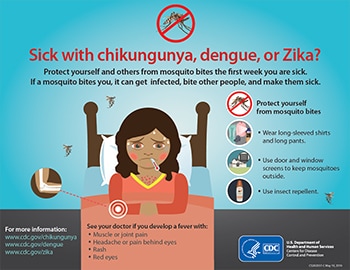Zika virus is spread to people through mosquito bites. The most common symptoms of Zika virus disease are fever, rash, joint pain, and conjunctivitis (red eyes). The illness is usually mild with symptoms lasting from several days to a week. Severe disease requiring hospitalization is uncommon. However, the threat to children and in utero babies is devastating.
Symptoms
- About 1 in 5 people infected with Zika virus become ill (i.e., develop Zika).
- The most common symptoms of Zika are fever, rash, joint pain, or conjunctivitis (red eyes). Other common symptoms include muscle pain and headache. The incubation period (the time from exposure to symptoms) for Zika virus disease is not known, but is likely to be a few days to a week.
- The illness is usually mild with symptoms lasting for several days to a week.
- Zika virus usually remains in the blood of an infected person for a few days but it can be found longer in some people.
- Severe disease requiring hospitalization is uncommon.
- Deaths are rare.
Diagnosis
- The symptoms of Zika are similar to those of dengue and chikungunya, diseases spread through the same mosquitoes that transmit Zika.
- See your healthcare provider if you develop the symptoms described above and have visited an area where Zika is found.
- If you have recently traveled, tell your healthcare provider when and where you traveled.
- Your healthcare provider may order blood tests to look for Zika or other similar viruses like dengue or chikungunya.
Treatment
- No vaccine or medications are available to prevent or treat Zika infections.
- Treat the symptoms:
- Get plenty of rest.
- Drink fluids to prevent dehydration.
- Take medicine such as acetaminophen to relieve fever and pain.
- Do not take aspirin and other non-steroidal anti-inflammatory drugs (NSAIDs), like ibuprofen and naproxen. Aspirin and NSAIDs should be avoided until dengue can be ruled out to reduce the risk of hemorrhage (bleeding). If you are taking medicine for another medical condition, talk to your healthcare provider before taking additional medication.
- If you have Zika, prevent mosquito bites[PDF – 2 pages] for the first week of your illness.
- During the first week of infection, Zika virus can be found in the blood and passed from an infected person to another mosquito through mosquito bites.
- An infected mosquito can then spread the virus to other people.
In May 2015, the Pan American Health Organization (PAHO) issued an alert regarding the first confirmed Zika virus infection in Brazil. The outbreak in Brazil led to reports of Guillain-Barré syndrome and pregnant women giving birth to babies with birth defects and poor pregnancy outcomes.
In response, CDC has issued travel notices for people traveling to regions and certain countries where Zika virus transmission is ongoing.
- No vaccine exists to prevent Zika virus disease (Zika).
- Prevent Zika by avoiding mosquito bites (see below).
- Mosquitoes that spread Zika virus bite mostly during the daytime.
- Mosquitoes that spread Zika virus also spread dengue and chikungunya viruses.
When traveling to countries where Zika virus or other viruses spread by mosquitoes are found, take the following steps:
- Wear long-sleeved shirts and long pants.
- Stay in places with air conditioning or that use window and door screens to keep mosquitoes outside.
- Sleep under a mosquito bed net if you are overseas or outside and are not able to protect yourself from mosquito bites.
- Use Environmental Protection Agency (EPA)-registered insect repellents. All EPA-registered insect repellents are evaluated for effectiveness.
- Always follow the product label instructions
- Reapply insect repellent as directed.
- Do not spray repellent on the skin under clothing.
- If you are also using sunscreen, apply sunscreen before applying insect repellent.
- If you have a baby or child:
- Do not use insect repellent on babies younger than 2 months of age.
- Dress your child in clothing that covers arms and legs, or
- Cover crib, stroller, and baby carrier with mosquito netting.
- Do not apply insect repellent onto a child’s hands, eyes, mouth, and cut or irritated skin.
- Adults: Spray insect repellent onto your hands and then apply to a child’s face.
- Treat clothing and gear with permethrin or purchase permethrin-treated items.
- Treated clothing remains protective after multiple washings. See product information to learn how long the protection will last.
- If treating items yourself, follow the product instructions carefully.
- Do NOT use permethrin products directly on skin. They are intended to treat clothing.

If you have Zika, protect others from getting sick
- During the first week of infection, Zika virus can be found in the blood and passed from an infected person to another mosquito through mosquito bites. An infected mosquito can then spread the virus to other people.
- To help prevent others from getting sick, avoid mosquito bites during the first week of illness.
Information for travelers
- Traveling? Visit CDC’s Travelers Health website to see if the country you plan to visit has any travel health notices.
- Mosquito Bite Prevention for Travelers [PDF – 2 pages]
- Read the Traveler’s Health Yellow Book for more information on Protection against Mosquitoes, Ticks, Fleas & Other Insects and Arthropods.
More detailed information can be found on CDC’s Zika virus web page for healthcare providers
